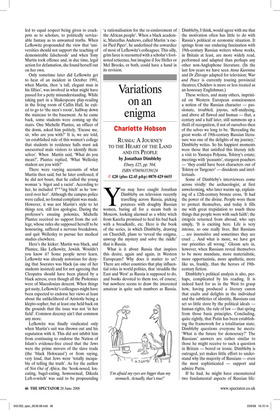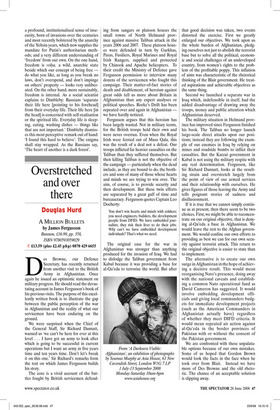Variations on an enigma
Charlotte Hobson
RuSSIA: A JouRNEY To THE HEART oF THE LAND AND ITS PEoPLE by Jonathan Dimbleby Ebury, £25, pp. 564, ISBN 9780563539124 ✆ £20 (plus £2.45 p&p) 0870 429 6655 You may have caught Jonathan Dimbleby on television recently travelling across Russia, picking potatoes with doughty Russian women, baring all for a steam bath in Moscow, looking alarmed as a white witch from Karelia promised to heal his bad back with a breadknife, etc. Here is the book of the series, in which Dimbleby, drawing on Churchill, plans to ‘reveal the enigma, unwrap the mystery and solve the riddle’ that is Russia.
What is it about Russia that inspires this desire, again and again, in Western Europeans? Why does it matter to us? There are other countries that play influential roles in world politics, that ‘straddle the East and West’ as Russia is supposed to do, and books devoted to them too, of course; but nowhere seems to draw the interested amateur in quite such numbers as Russia. Dimbleby, I think, would agree with me that the motivation often has little to do with Russia’s political or economic situation. It springs from our enduring fascination with 19th-century Russian writers whose works, in Britain at least, are more widely read, performed and adapted than perhaps any other non-Anglophone literature. (In the last few years we have seen Anna Karenina and Dr Zhivago adapted for television; War and Peace is currently touring provincial theatres; Chekhov is more or less treated as an honorary Englishman.) These writers, and many others, imprinted on Western European consciousness a notion of the Russian character — passionate, troubled, joyous, self-analysing, and above all flawed and human — that, a century and a half later, still summons up a thrill of recognition, if not of ourselves then of the selves we long to be. ‘Rereading the great works of 19th-century Russian literature was one of the delights of my journey,’ Dimbleby writes. So his happiest moments were those that satisfied this literary itch: a visit to Yasnaya Polyana, Tolstoy’s estate; meetings with ‘peasants’, sturgeon poachers — ‘they could have been characters out of Tolstoy or Turgenev’ — dissidents and intellectuals.
Some of Dimbleby’s interviewees come across vividly: the archaeologist, at first unwelcoming, who later warms up, explaining of a 12th-century bronze cross, ‘It had the power of the divine. People wore them to protect themselves, and today it fills me with great trepidation to touch these things that people wore with such faith’; the émigrée returned from abroad, who says simply, ‘It is exciting here. Life is very intense, so one really lives. But Russians ... are insensitive and sometimes they are cruel ... And what is more, we have got our priorities all wrong.’ Gloom sets in, however, when Russians reveal themselves to be more mundane, more materialistic, more opportunistic, more apathetic, more like us, frankly, than the heroes of 19thcentury fiction.
Dimbleby’s political analysis is also, perhaps, complicated by his reading. It is indeed hard for us in the West to grasp how, having produced a literary canon that exalts and delights in the individual and the subtleties of identity, Russians can set so little store by the political ideals — human rights, the rule of law — that spring from those basic principles. Concluding, quite rightly, that Putin has been establishing the framework for a totalitarian state, Dimbleby questions everyone he meets: ‘What is the future for democracy?’ The Russians’ answers are rather similar to those he might receive to such a question in Britain — bored or ironic. Dimbleby is outraged, yet makes little effort to understand why the majority of Russians — even the most sophisticated — support and admire Putin.
If he had, he might have encountered two fundamental aspects of Russian life: a profound, institutionalised sense of insecurity, born of invasions over the centuries and most recently bolstered by the anarchy of the Yeltsin years, which now supplies the mandate for Putin’s authoritarian methods; and a very different understanding of ‘freedom’ from our own. On the one hand, freedom is volya, a wild, anarchic state beside which our concept of being free — do what you like, as long as you break no laws, don’t overspend, and don’t impinge on others’ property — looks very unliberated. On the other hand, more sustainably, freedom is internal. As a social scientist explains to Dimbleby: Russians ‘separate their life here [pointing to his forehead] from their everyday life. Their life here [in the head] is concerned with self-realisation or the spiritual life. Everyday life is sleeping, eating, washing dishes — things like that are not important.’ Dimbleby dismisses this most perceptive remark out of hand: ‘I found this hard to believe’. The enigma shall stay wrapped. As the Russians say, ‘The heart of another is a dark forest’.



















































































 Previous page
Previous page